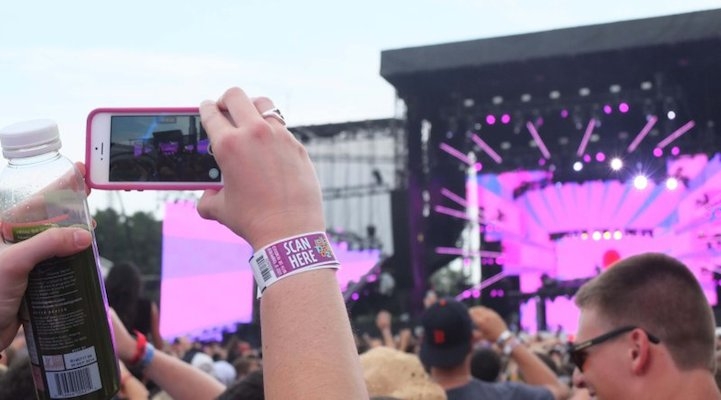 Image: Lollapalooza, TradableBits
Image: Lollapalooza, TradableBits
[This article appeared originally on LineupLive.com, a contributed article by Kim Owens.] The year of cashless. The year of beacons. The year of RFID. I think it’s also the year of the Goat, if I’m not mistaken. Thing is, it’s the year for all of it in 2015. The one thing tying it all together, not forgetting ticketing and social media, is the data. It’s all these points of information that let the promoter, the festival organizer, the live event producer have the insight to make better decisions, which leads to a better experience for those people coming through the gates and through the doors.
When you open up the world beyond live events, how the Internet of Things will create even more personal data far beyond today’s data points of what we search on, what we buy, how we buy, where we travel and so on, it can feel like that scene from the movie ‘Scanners’ where the guy’s head explodes.
For the sake of our sanity, let’s take a few steps back. Let’s take look at what was learned in 2014, by the festival promoters and the companies introducing the next-generation of event technology solutions, after their data-generating trials. How they made sense of and use of these new information points, and where that’s leading the planning and the managing of festivals and live events in 2015 and beyond.
Connecting with the Fan Year-Round Through Social Data
Social media’s return on investment, from the staff required to manage, curate and create campaigns to the cost of advertising dollars, has been a point of contention for every industry. Last year Eventbrite put a lot of that debate to rest, publishing their Britepaper that presented the numbers reflecting how social sharing is driving real revenue, ticket sales and awareness for music festivals and shows.
A sampling of those statistics showed that each Tweet on Twitter drove $2.18 in ticket sales but drove twice as much traffic back to a festival’s website ticket page, while each Facebook share resulted in $4.15 of additional ticket sale revenue. What surprised Martina Wang, Head of Music Marketing at Eventbrite, was that 17 percent of social-related conversions were happening during the course of the festival itself, be it a one-day or up to a three-day event.

Image: Eventbrite’s ROI of Social Media Marketing, Music and Festival Insider Series
“To me it’s significant that one in five conversations were actually able to happen during the event,” Wang said, taking into account the connectivity constraints at most festivals. “So what happens if everyone is able to tap into their phones and share out information in real time? What could the potential be to [increase] the amount of conversations? I think it’s extremely high.”
Read the rest of the article at LineupLive.com, which delves into how data is impacting C3 Presents and Lollapalooza, Bonnaroo, Insomniac and Electric Daisy Carnival, AEG and FYF Festival, SXSW and more at “The Year of the Sharing Data Economy.”

